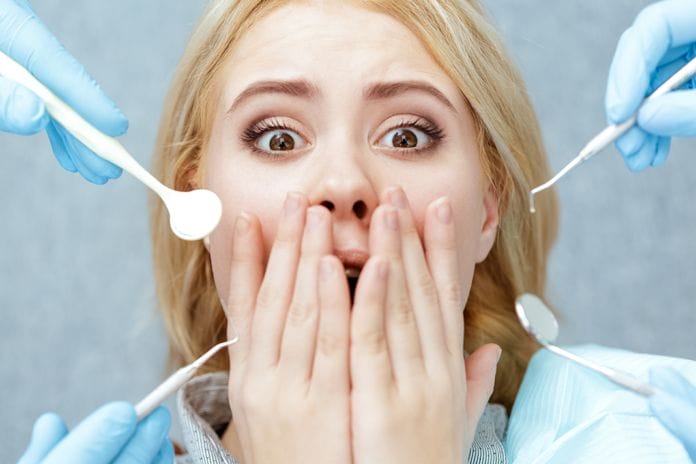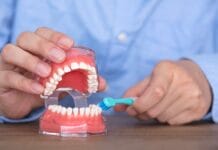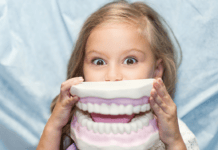How many times a week do you hear the phrases, “I hate the dentist, I always dread coming here, I would rather be somewhere else,” or some other phrase indicating the patient highly dislikes being at the dental office, which includes your operatory? When hearing these phrases, we can either become offended at the statement, and take it personally, or we can be understanding and compassionate, realizing they are only expressing their fear and anxiety.
Is dental phobia real, or could it be something else? Some say it’s all in the patient’s head and they are just being dramatic. So, what causes phobias? I would like to understand because I have no idea why heights terrify me, and I feel as if I’m being pulled to fall. There have been statements made dental phobia is generally caused by a traumatic dental-related experience as a child, however, that doesn’t always seem to be the case. Some adults have no such memories and have related their fear and anxiety to bad experiences that aren’t necessarily traumatic. Others have stated they can’t remember a specific bad experience at all. We will not be able to please and comfort all patients, but we have a responsibility to do our best to find options that will allow them to have the best experience possible.
While studying this topic, I was surprised to learn a phobia can begin up to the age of 30 and can be “learned” by a parent or other member of the home. Therefore, it is important to remind parents to speak of the dental office in a positive way to their children to help prevent passing along or suggesting any fear. It was also interesting to find we often misuse the term “dental phobia.” Dental phobia has become an umbrella term used to cover anxiety and a range of fears that surface while at the dental office.
Dental phobia is an intense, unreasonable fear that will cause someone to go to extreme measures to avoid an appointment unless in extreme pain. These patients have a feeling of fear that surfaces even at the thought of, or when seeing a photo of, a dentist. Most people with anxiety will tolerate their appointments while making it known they dislike being there. Some fears that may surface while at the dental office can include agliophobia, which is fear of pain. For these patients, it’s obvious they are tense because they expect something to hurt at any moment. Another is agoraphobia, which is a fear of places and situations that might cause panic, helplessness, or embarrassment. Others with a dental phobia may experience claustrophobia, a fear of small spaces; this can be caused because, during our treatment, we are in their personal space.
We must have compassion and realize some of these fears may stem from abuse and other bad experiences that have occurred outside of the dental setting, which the patient may not disclose. An increased gag reflex is real and may also contribute to patients being anxious. Then there are the fears we consider more commonly linked to the dental office such as trypanophobia (needles) and dentophobia (dentists in general). These fears, along with anxiety, contribute to patients dreading upcoming appointments, which can lead to cancellations.
Many times, the condition may simply be generalized anxiety that is heightened due to being in a dental office. Signs of anxiety may include excessive speech, increased heart rate, increased salivary flow, irritability, and possibly not speaking at all, which may cause us to make false assumptions about a patient. We have all experienced patients with a phobia, increased anxiety, and even others who try to hide their anxiety.
Patients with dental phobia and anxiety are among those we remember the most, but hopefully, they remember our kindness. I see these patients as an opportunity to make a difference. When patients appear to be difficult, and not happy to be in my chair, my goal for them is to be smiling and be on friendly terms with me, by the end of their appointment.
Working the evening shift, I typically don’t prefer a new patient to be scheduled for the last appointment time, but occasionally we do not have a choice due to limited availability. At eight o’clock one evening, there was a new patient scheduled with a note stating her mother had called and informed us the patient may need nitrous oxide. I was mentally prepared to make sure she would leave our office being able to say she had a good experience. This patient had not been to the dentist for at least five years due to being nervous. After speaking with her, it became evident she struggled more with anxiety than phobia due to bad experiences that included painful, rushed recall appointments. She continued her appointment without the use of nitrous, and I decided to use an ultrasonic scaler along with hand scaling in hopes of minimizing discomfort. Most patients either love the ultrasonic or dislike it due to sensitivity, so I was hoping she would respond well. By the end of the appointment, the patient told me the visit was much better than her previous experiences, and how much she loved the ultrasonic scaler.
On another occasion, a friend of mine was talking with me about bad experiences with dental hygienists, which contributed to her not committing to six-month recall appointments. She discussed how the dental hygienist plays a huge part in either lessening her anxiety or increasing it. On one occasion, the dental hygienist she saw was very friendly and made her feel at ease from the beginning. At her next visit, she saw a different hygienist who was much less friendly, seemed rushed, and overall made her feel uncomfortable.
This goes back to my previous article, “How to Build Good Rapport with Patients and Set Yourself Apart.” When we build a good rapport with patients, it will hopefully decrease anxiety and missed appointments. However, there are always exceptions to the rule, and this is where my husband gains recognition. Imagine the one patient you know who has a true dental phobia, gets to the appointment early if they make it at all, expects to get back right on time, asks if you are almost finished throughout the appointment, and wants out as soon as possible; that’s my husband. He is one of the most dental phobic patients I know and has told me he cannot recall any traumatic experiences. However, he has mentioned how being at the dentist office reminds him of a movie he saw about a crazy dentist he saw years ago, and he does not like the sound of the drill even from another room.
Several years ago, I worked for a dentist who offered sedation, and my husband agreed to go. Surprisingly, he only needed an adult prophy and two fillings. For most people, this would be a simple appointment, but my husband had to be sedated for all of it. Since then, he receives nitrous during recall appointments but has stated he will require sedation for any restorative treatment needed. My husband’s common phrase when referring to a dental appointment is, “I am going to the torture chamber.” Listening to him for many years may have helped with not taking it personally when patients inform me they would rather be anywhere else.
On one occasion we were not able to offer nitrous, but my husband agreed to keep his appointment with a hygienist I had worked with for several years. It must not have gone well since they both let me know that would not happen again. The hygienist stated he was obviously tense the entire time. When patients are tense, so are we. To help our patients have the best experience possible, it’s important to consider options for patients with anxiety and phobia.
As healthcare providers, we have chosen to help others. In doing so, we must consider ways in which we can minimize and possibly diminish this fear our patients are expressing. Some patients have stated their anxiety has been increased due to negative attitudes from the dental team, the provider making them feel ashamed, they sensed an attitude of indifference from the provider as if being rushed, and they felt the provider was aggressive during the procedure while not acknowledging the patient’s discomfort.
As mentioned before, sometimes a patient cannot recall a bad experience but will mention the sounds of the office increasing anxiety. Since noises increase anxiety in many patients, having disposable ear plugs in the operatory or recommending the patient bring earbuds to listen to music can be helpful. Decreasing the light in the room or giving the patient tinted safety glasses can also help patients with anxiety. Patients have confirmed the tinted glasses helped them relax. Several patients, including one of my sons, have described the instruments scraping against their teeth are to them like nails on a chalkboard, contributing to increased anxiety. These patients will typically prefer the use of an ultrasonic scaler.
We must prepare mentally and remind ourselves to appear calm, no matter how frazzled we may be on the inside, to help decrease their anxiety. Sometimes it may help to schedule more time with a dental phobic patient to avoid them sensing the stress from feeling rushed with time and not being able to slow down to give them the care needed. The patient may need nitrous and several breaks during their appointment. Other times the patient may prefer spending less time in the chair and agree to schedule three to four-month recall appointments. It is also important to do our best to get them back on time as their anxiety will continue to increase the longer they sit in the waiting room, and they just may walk out.
Other ways to improve the patient experience may include recommending products such as water flossers, sonic toothbrushes, interdental brushes, products for xerostomia and sensitivity, and any others that aid in better oral hygiene and decrease sensitivity. This will decrease time and uncomfortable prophies with the dental hygienist and will lessen visits involving more invasive procedures. It is also our responsibility to educate and try different approaches to help the patient understand the negative consequences of poor oral health and missed recall appointments, which includes more time in the dental chair and decreased overall health.
If the phobia or anxiety remains after doing our best, the patient will still feel a connection in a way that will increase the likelihood of them maintaining oral health by keeping their recall appointments. Even my severely dental phobic husband now keeps his recall appointments due to the kindness shown by his dental hygienist. You may be wondering why he is not a patient of mine, or you may understand if you also have family members with dental phobia or anxiety. It is always best to prevent conflict as much as possible in any relationship, especially a marriage. He being able to see someone else has worked well for us. However, I usually feel indebted to my fellow dental hygienist who treats him. Creating a positive experience as much as we can, along with being understanding, is something that will stay with that patient.
Most of us have had to comfort a patient in the dental office at some point since dental anxiety is more common than most people realize. It is easy to become offended or maybe even lack patience with the behaviors and comments coming from patients struggling with these conditions, but it is important to understand not all are trying to be difficult. While many patients may express their extreme dislike of being at the dental office, we also must keep in mind other patients are trying to hide their fear and anxiety because they are embarrassed. For this reason, it is important we recognize body language and acknowledge their discomfort to let them know we are aware and want to give them a better experience while being at an appointment they have been dreading.
Many patients with dental anxiety and phobia will miss appointments and develop poor oral health, which leads to low self-esteem and poor overall health. We are now aware of the oral-systemic link and how periodontal disease is associated with cardiovascular disease, stroke, diabetes, and premature birth. Therefore, it is extremely important our patients know we care about their overall health and experience. When patients know we are genuine, they are less likely to miss appointments because we have developed a trusting relationship. Let us always remember to treat others the way we want to be treated, or better. As healthcare providers, we have a responsibility to give our patients the best possible care. If we begin to lack compassion, it’s time to put away the scalers and step away from the healthcare profession.
SEE ALSO: Patients with Dental Phobias: How Do We Gain Trust?
DON’T MISS: 7 Ways to Turn Awkward Appointments into Amazing Ones












